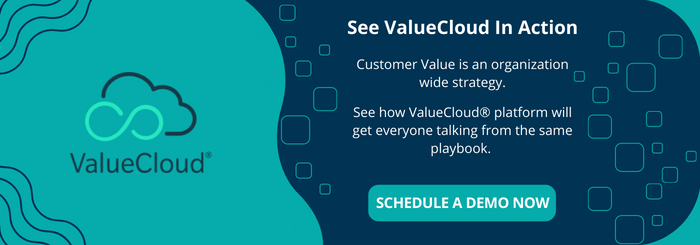The Keys to Effective Cross-Team Customer Value Delivery

Economic pressures over the past few years have resulted in increased scrutiny for expenditures under new and existing technology contracts. This heightened emphasis on financial impact products and services deliver requires sales teams and customer success staff to elevate their approach. Conversations with prospects and existing customers must focus on tangible value. Instead of just being the purview of sales teams, value must be front and center in every customer interaction.
To stay competitive, companies today must be ready to deliver both value hypotheses during the sales process and actual measures of value realization throughout the relationship. Customers want to know that what was promised in those early interactions continues to be delivered. According to IDC, “In today’s subscription economy, up to 90% of the relationship between a buyer and a seller is as a customer, not a prospect, and losing track of value delivery can be fatal at renewal time.”
Status Quo Selling isn’t Enough Anymore
Value selling is not a new approach. What is different now is the demand for value-based communications throughout your relationship with the customer. With these expanded needs for value metrics, traditional value engineering approaches no longer work. It used to be that only the largest deals merited a business value hypothesis. This was because value expertise resided wholly with a team of business analysts that conducted time-consuming research and modeling to deliver these business cases large prospects.
In addition to being staffed by expensive experts, these efforts typically depended on unscalable approaches using behemoth spreadsheets or highly complex, self-built tools. These labor-intensive, high-touch approaches can no longer keep up with the demand for value metrics today. With more teams needing to share these measures, value metrics must be more broadly accessible by business users throughout marketing, sales, and customer success for them to be effective.
Would you like to see ValueCloud in action? Book a no-obligation demo now.
A Smarter Approach to Value Metrics
For value to have an impact across all of your customers and all of your departments, your approach to value must be scalable, shareable, and reusable. You need a solution that can lead with value in top-of-funnel marketing, demonstrate value potential during the sales process, and prove value delivered after the deal is signed. The only way to leverage value with this scope is technology.
Scalable value efforts demand a centralized data platform with automation built in. To establish a strong value strategy, companies need a database of empirical value evidence that even the most basic of business users can access and leverage. That demands effective training on how to use the platform for every value stakeholder within the organization.
Defining your Value Conversations
According to an IDC perspective by Gerry Murray, there are six stages in the business model where value should be monitored and measured:
- Explore
- Evaluate
- Purchase
- Expand
- Renew
- Advocate
In each stage, marketing, sales, product, implementation, success, and support should be coming together to measure and manage the value needs of clients. This is both a pre- and post-purchase effort.
IDC identifies a range of metrics by department that can be used to support an organization-wide value delivery approach. From engagement metrics gathered by marketing and economic value modeling presented by sales early in the process to implementation timelines achieved and quarterly business reviews over the long-term, a variety of measurements can both inform value modeling and serve as target metrics for sharing with the audience. One key piece of advice IDC offers: bigger is not always better. An overpromise of value can be deadly. What you want to focus on is clarity and consistency when it comes to value promised.
An effective technology platform must be able to capture this data and calculate these formulas to support all of your customers. This is the power of the DecisionLink ValueCloud® customer value management platform. With ValueCloud®, you have a solution that meets the requirements for a cloud-based solution as outlined by IDC.
To see the value metrics and technology priorities IDC recommends, download the report today.

 ValueCloud
ValueCloud
.png?width=118&height=76&name=Rectangle%20(3).png) ValueCloud Ignite
ValueCloud Ignite
.png?width=92&height=92&name=Rectangle%20(4).png) Free Assessment
Free Assessment
.png?width=100&height=100&name=Rectangle%20(5).png) Watch a Demo
Watch a Demo
.png?width=82&height=96&name=Rectangle%20(6).png) Value Calculator
Value Calculator

.png?width=62&height=51&name=Group%2010%20(1).png) Marketing
Marketing
 Sales
Sales
 Customer Success
Customer Success
 Engage Prospects
Engage Prospects
 Win Deals Faster
Win Deals Faster
 Retain Customers
Retain Customers
.png?width=62&height=62&name=Rectangle%20(8).png) Adopt and Scale
Adopt and Scale
.png?width=54&height=54&name=Rectangle%20(9).png) Cybersecurity
Cybersecurity
 Healthcare
Healthcare
.png?width=54&height=54&name=Rectangle%20(10).png) IT & Software
IT & Software




